Transcription
H A R L A N R I C H A R D S
May 13, 2014
How I got Life In Prison, Part 2
This is a continuation of my blog posting dated May 12, 2014.
At my first meeting with Rosen after my conviction he was sympathetic to my plight. he offered to do my appeal for free. I told him I wanted him to give back $5,000 to my parents and I would get someone else for my appeal. If he didn't, I would reveal what he planned for the court. He refused and I exposed him.
I met a guy in the county jail who knew a lot about the law. Teddy Lee Heffner had his own law books and shared them with me. I told him all about what Rosen did in my case. I used his law books to draft my own post-conviction motion and filed it in the court. The public defender refused to appoint counsel for me unless I withdrew my pro se motion. I had no choice. Even though I read enough in the law books to see I got shafted by my attorney, I was not able to represent myself in post-conviction proceedings. The public defender's office had to find a private attorney to represent me because one of the jailhouse snitches/liars was currently being represented by a public defender and it would have been a conflict of interest to represent me as well. It turned out that neither snitch/liar was willing to come forward to testify at my trial without being able to do so anonymously but their statements had allowed the prosecutor to cross-examine me during the trial about the lies they told. That, of course, made it seem like I really had made the statements.
I went to Dodge Correctional Institution for about 3 months. It was the Department of Corrections' (DOC) intake facility where each prisoner gets evaluated so the DOC can decide where he will be housed. In my case, being 30 years old with a life sentence it was a foregone conclusion - Waupun Correctional Institution (WCI). There were only two maximum security facilities in addition to DCI - the Green Bay Reformatory for young guys and WCI for old guys. DCI was a miserable place to be. Not much to do. WCI was a bit better.
I never believed for a minute that I would serve very much time on the life sentence. I was clearly not guilty of murder and just as clearly did not get a fair trial. I expected to be back out in a year or so and planned accordingly. Then the delays started. First, it was getting an attorney, then it was waiting for transcripts, after that it was scheduling
Harlan Richards/page two/May 13, 2014
conflicts for my hearings. All the while, I was in the law library reading case law. I bought my own set of statute books and read them cover to cover. I sent my appellate attorneys letter after letter. I got my own copy of the transcripts to study. I did everything I could to aid in my appeal.
I was so naive. I thought that the judge would hear the evidence and base his ruling on the facts presented. I did not think of judges as human beings, people with biases and beliefs that influenced their decisions. Many people knew what Rosen did to my defense. My father, Lyle, Lyle's attorney, the witness I recruited to lie at the trial and I, all testified to what Rosen had done. None of us had a chance to prepare, rehearse or compare our testimony with each other. It was essentially five different sources all saying the same thing: Rosen created the fabricated defense and had me go along with it. Rosen and his partner testified that they discussed their testimony before the hearing and that I had refused to tell them what happened until midway through the trial. The judge held that Rosen and his partner were telling the truth and the rest of us were lying. Looking back on it, it was the only thing he could do. He had the choice of accepting the truth and destroying a prominent attorney's career or leaving a two-time killer in prison with a life sentence he may have deserved. Which would you do if you were the judge and had worked with the attorney for years?
I was disappointed with the court's decision. Surely, the appellate court judges would see through the cover-up by the trial court and grant me relief. I knew there was no way a Wisconsin Court of Appeals would leave an innocent man in prison because of what his attorneys did to him. Wrong again. My post-conviction attorneys were competent, able lawyers. They did everything minimally required to represent me. I finally realized during the appeal that that is what they were there for: to give me legally competent representation while ensuring that my murder conviction stayed intact and Rosen's reputation stayed unsullied. No doubt, they believed they were giving me good representation. But they were not the zealous advocates on my behalf that I needed to win my appeal. All this time I had been studying the law. I worked in the prison law library and had begun filing lawsuits against the DOC on various issues. I was learning but I was far short of being capable of representing myself.
There was one issue regarding the jury instructions I wanted my attorneys to raise relating to the offense of manslaughter. The judge misstated the instructions preventing the jury from considering whether I should have been found guilty of manslaughter instead of murder. My attorneys wouldn't raise it
Harlan Richards/page three/May 13, 2014
and I was not capable of doing it on my own. But I decided I would rather have my fate in my own hands than those of attorneys I thought were selling me out. I fired them and went pro se. Another one of my bold moves which ensured I would serve life in prison. I was naive enough to believe that the appellate court would reverse the murder conviction of a pro se defendant if he deserved a new trial. I believed that the courts existed to see that justice was done. Not in Wisconsin. Maybe I would have had a chance in California, where people like O.J. Simpson can buy their acquittal or Florida where George Zimmerman could get away scot-free after gunning down a black teenager. In Wisconsin, the criminal justice system exists solely to enforce the power of the State. It does a very good job of it. To revise the conviction of a pro se killer would undermine the very thing the court system exists to protect - its own power. Judges are merely attorneys with black robes. They could not, would not, accept a pro se, self-taught prisoner's legal arguments and rule in his favour against a licensed attorney. I lost my appeal.
I filed a petition for review in the state Supreme Court. At that time, there were 4 conservative judges and 3 liberal judges. The liberal judges were called that because they believed in protecting the rights of citizens. The conservatives had kept a lock on the court for years. No criminal defendant had a chance in that court. What generally happened was that a criminal defendant would win his appeal and the Supreme Court would grant review to take it away from him. Ex-Governon Tommy Thompson was a master at maintaining control of the state Supreme Court. Every time a conservative was going to step down from the court he retired early enough so that Thompson could appoint another conservative, thus granting the new judge the incumbent's advantage in the election. It worked well for years. I lost every step of my direct appeal. I could have filed a petition for a writ of habeas corpus right then but each defendant only gets one chance in federal court. I wanted to make sure I had everything in from of that court when the time came. I had been in prison 31 years and realized it was going to take me a lot longer to get justice than I had first figured. I settled in to win a long, drawn out war.
I knew that Dick Endres had a reputation as a violent, dangerous person. I had heard vague references to things he had done but did not have any of the facts. At the trial, the prosecutor misrepresented him to the jury as a family man of good standing in the community. The judge, prosecutor and my attorney all knew the truth. Everyone knew the truth except for me and the jury.
Harlan Richards/page four/May 13, 2014
I set out to get whatever evidence I could get on Dick's past. I sent a request to the Crime Information Bureau for information and they sent me his rap sheet - page after page of arrests and police contacts. Most of the entries were from the Madison Police Department so I sent them an open records request for all arrest reports concerning Dick. At first, they didn't answer me but I persisted. I threatened legal action if they did not respond. They finally sent me a letter telling me I would have to pay them $100 in advance for them to begin processing my request because there were so many reports on him. I thought they were bluffing just to get me to abandon my request figuring that I would not send them $100. I sent the money and a few weeks later I got a stack of police reports along with a letter telling me to send another $100 if I wanted them to send more documents. I ended up sending them about $300 and obtaining a stack of reports about a foot tall concerning Dick's police contacts. He had a 20-year history of unprovoked attacks on people he didn't know. The exact same thing he did to me!
I also made a records request to the State Historical Society to see if his old prison records were available. They were but I was told I had to prove he was dead before I could get access to his file. I thought it was kind of ironic that I was serving a life sentence for his death yet had to prove he was dead to get access to the documents. I got them and they showed more of his volatile nature and destructive acting out as away of life.
I knew the prosecutor had all the information about Dick so I made an open records request to the Dane County District Attorney to gain access to the closed prosecution file in the murder case. They ignored my request so I filed a writ of mandamus in the circuit court. The court ordered him to turn over the documents be and refused. The judge ordered a fine of $100 per day be assessed against him until he surrendered the documents. He appealed and the appellate court stayed the imposition of the fine until the appeal was completed. It tooth appellate court a year but they agreed with me and once again ordered the documents to be turned over to me. The State Attorney General petitioned for review and the state Supreme Court granted it.
The case went before the state Supreme Court. It was all briefed and awaited a decision. At the November election that year Democrat Jim Doyle was elected as Wisconsin Attorney General. One of his first acts when he took office was to file a motion to dismiss the petition for review and leave the
Harlan Richards/page five/May 13, 2014
appellate court decision intact as the controlling standard on access to closed prosecutorial files. The Supreme Court refused to dismiss the petition and a few weeks later issued a decision reversing the appellate court and overturning 20 years of prior case law to deny me access to the documents I needed to show that I did not get a fair trial [underlined text begins] (State ex rel Richards v Foust) [underlined text ends]. The conservatives ruled against me and the liberals filed a dissenting opinion. It was a bad precedent which set back the cause of open access to government a long way.
I had all the documents I could obtain under the open records law so I began to prepare my post-conviction motion. Under the law, I was permitted to file a motion for post-conviction relief at any time if there was a constitutional error. It had been the settled law of Wisconsin for decades. I relied on this to present my issues regarding Dick's past and the jury instruction error. The trial court sat on my motion until the state Supreme Court issued another draconian decision. [underlined text begins] State v Escalona-Naranja [underlined text ends] created a procedural block to stop any defendant from a filing a claim for relief if the claim was known at the time of the direct appeal and not raised on direct appeal. My motion was denied on those grounds. For the second time, 20 years of prior precedent was thrown out causing me to lose my chance for a new trial.
I appealed the decision arguing that the procedural bar should not apply retroactively. I also filed a habeas corpus petition in the court of appeals arguing ineffective assistance of post-conviction counsel because my attorneys refused to raise the jury instruction issue while they were representing me. My habeas petition was denied almost immediately. Later, my appeal was denied as well. The court did agree that I was denied a fair trial by use of the faulty jury instruction but that I had procedurally defaulted on the issue and could not get relief. The court then went on to say that if I wanted to challenge the conduct of my appellate attorneys I should file a petition for a writ of habeas corpus with the appellate court to reinstate my direct appeal!
At that time, motions for reconsideration were not permitted in the appellate court so I filed a petition for review. Part of my argument was based on the hypocrisy of the appellate court in denying my habeas petition and then telling me I should have filed a habeas petition if I wanted to raise the issue. A few days after my petition was filed, the appellate court issued an amended decision deleting the reference to filing a habeas corpus petition. This cleared the way for the Supreme Court to deny my petition - if not with a clear conscience, at least with a clear record.
Harlan Richards/page six/May 13, 2014
I was finally ready to file a federal habeas corpus action. But during the years it took me to get through the state courts a second time, the federal congress passed the Anti-Terrorism and Death Penalty Act which rewrote the standards for federal habeas corpus actions filed by State prisoners. The new, deferential standard prevented the federal court from granting me any relief. There was a virtually identical jury instruction issue of of Illinois which had been found unconstitutional by the federal court and which allowed numerous Illinois prisoners to get new trials. The federal court refused to grant me the same relief. The flood of conservative federal judges appointed when Reagan and Bush Sr. were president made it impossible to win in federal court. There were many published federal court decisions which should have entitled me to relief but no judge would order a new trial. More than a dozen years after I was wrongly convicted of murdering Dick Endres my conviction became final. I had to accept that I would be serving a life sentence and would only be released if I earned a parole.
Even though I knew I was innocent of murder, I had to accept that I could not overturn my conviction. I focused on getting a parole. In 2002, I transferred to minimum security and eventually to community custody where I could go out on work release. I have kept a perfect conduct record since I've been in prison. Even though it was a long, slow process to earn a parole I turned my life over to God and was patient. Things changed in 2011 when Scott Walker became governor.
A few days after he took office I was returned to a medium security prison based solely on my current offense and prior criminal record. I challenged the parole commission and prison classification officials in numerous acting over the last 3 years. The courts have held that the parole commission can increase the length of my defer for any reason or no reason at all and I cannot challenge it. The courts then held that the classification officials can rely on the increased defer to return me to medium security and I cannot challenge that either. They can hold me in minimum security forever even though I spent 9 years in minimum security and already proved that I am not a risk to anyone.
The only chance I have of release is to show that I did not murder Dick Endres in 1984 and the only reason I was sent to prison was because I did not get a fair trial.
You don't have to take my word for any of this. I am in the process of having the entire record of the trial and various appeals converted to digital format and will make it available to anyone who requests it. I will make a follow-up blog posting when the record is available.
Other posts by this author
|
2021 jun 25

|
2021 may 25

|
2021 apr 23

|
2021 feb 19

|
2021 feb 17

|
2021 feb 15

|
More... |

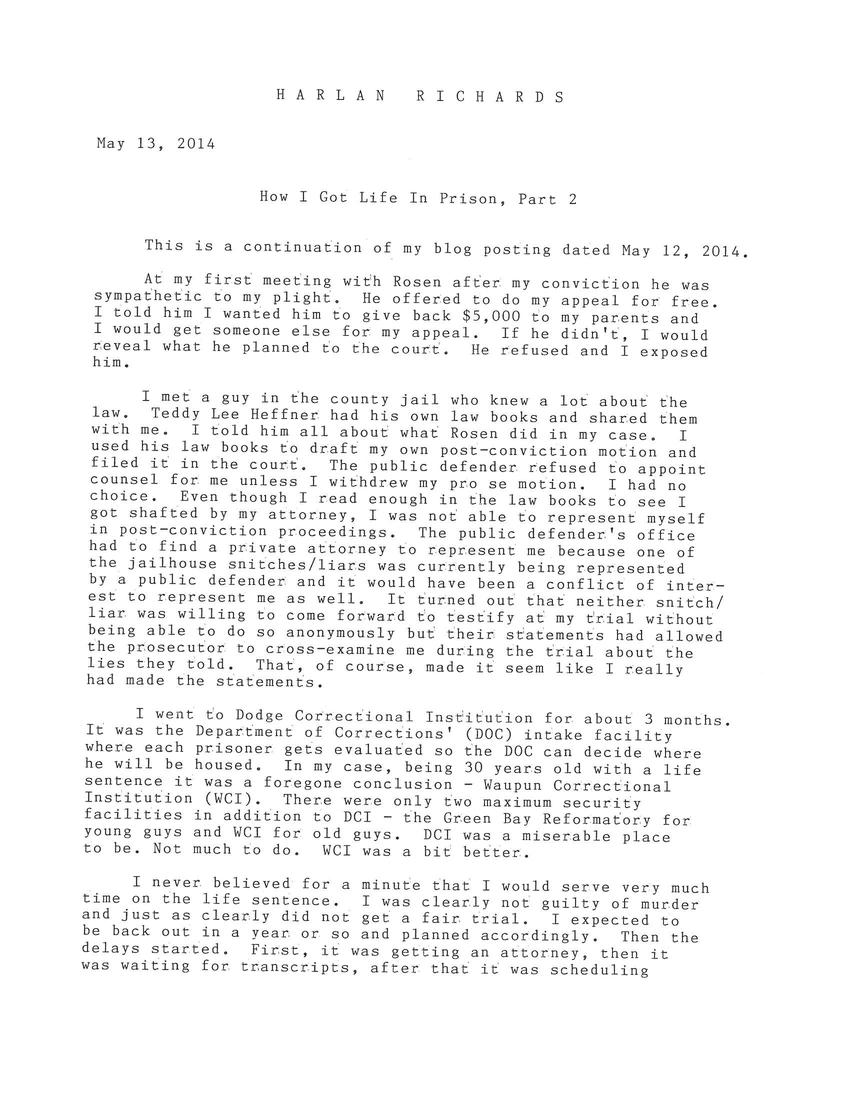
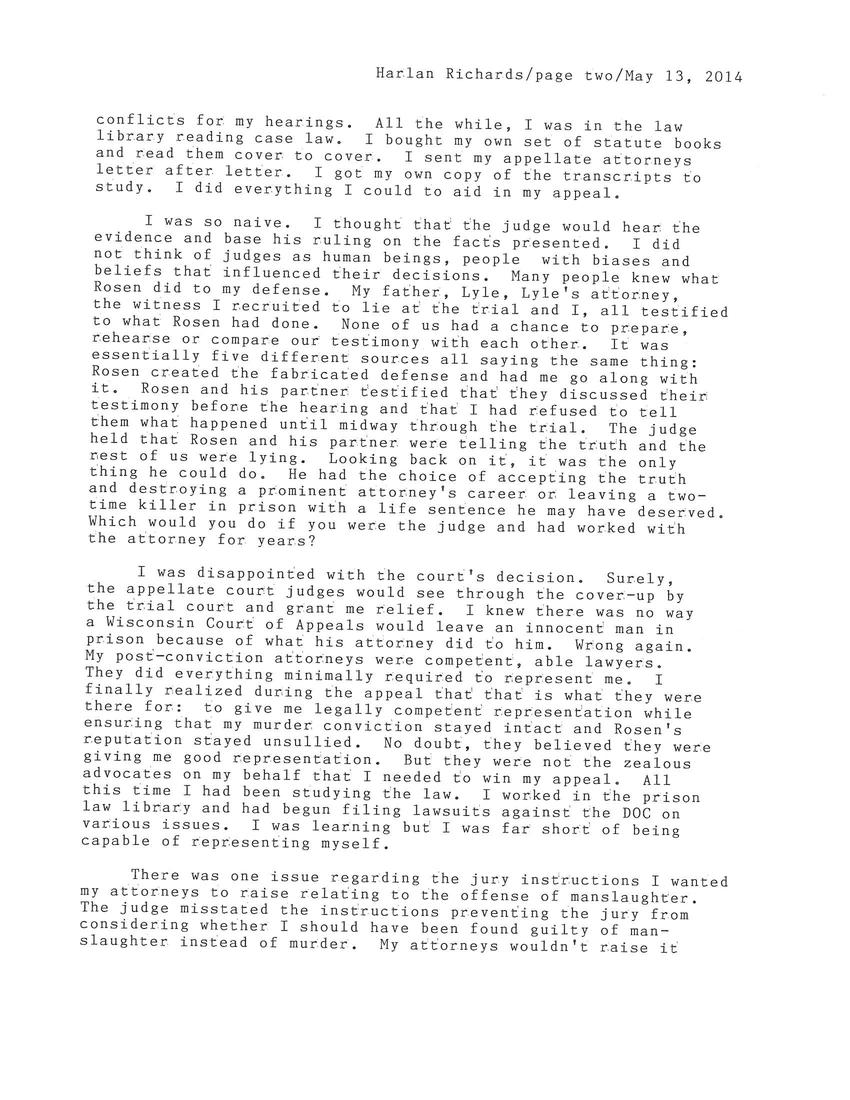
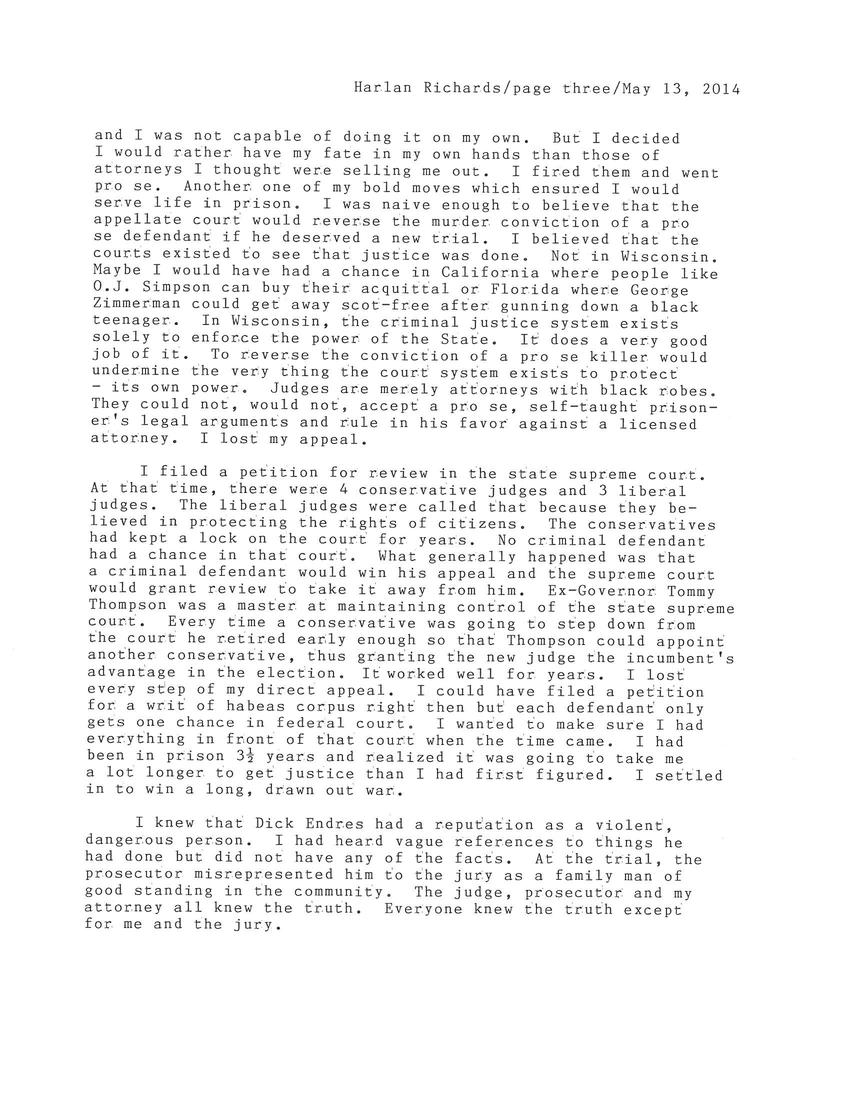
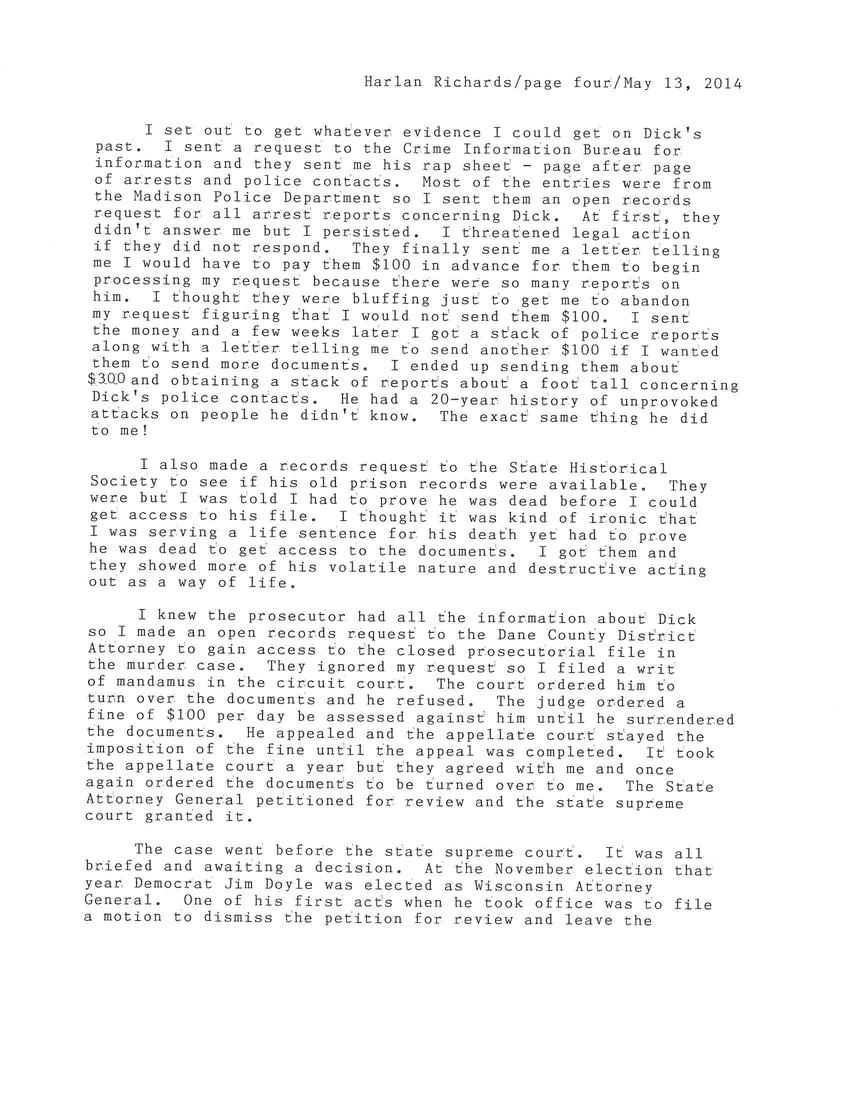
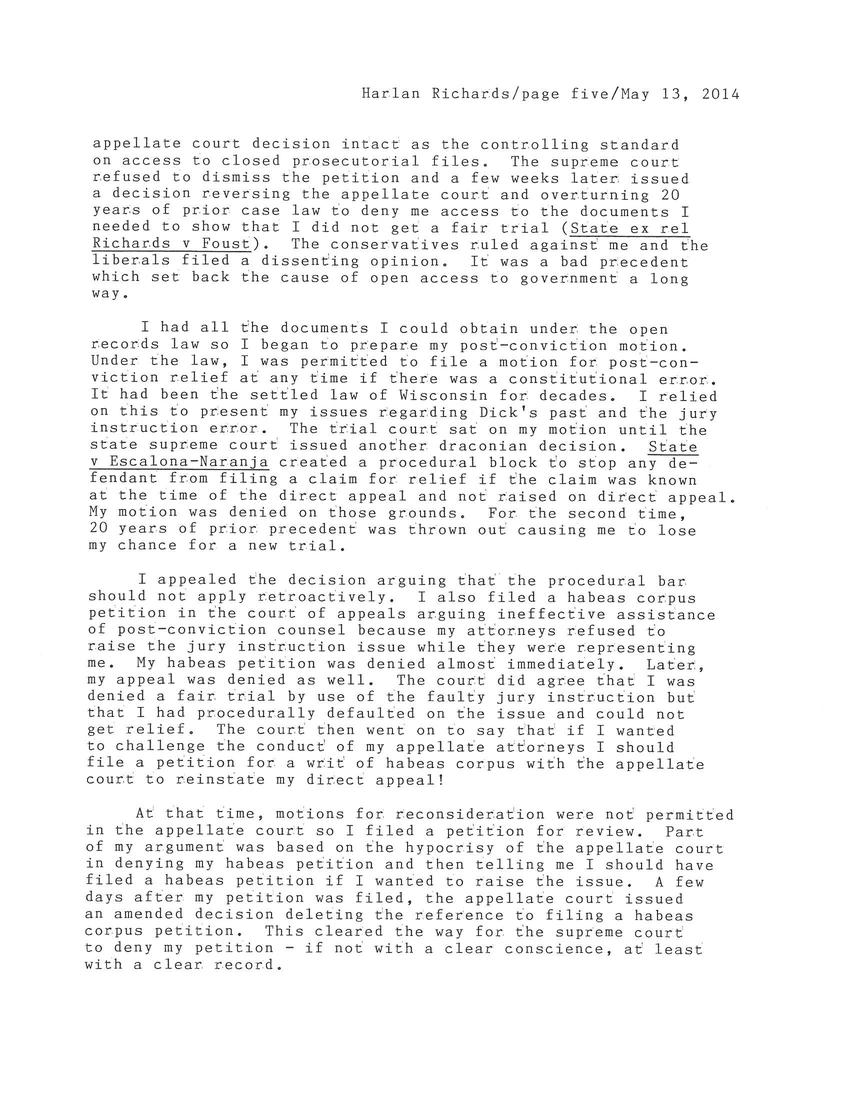
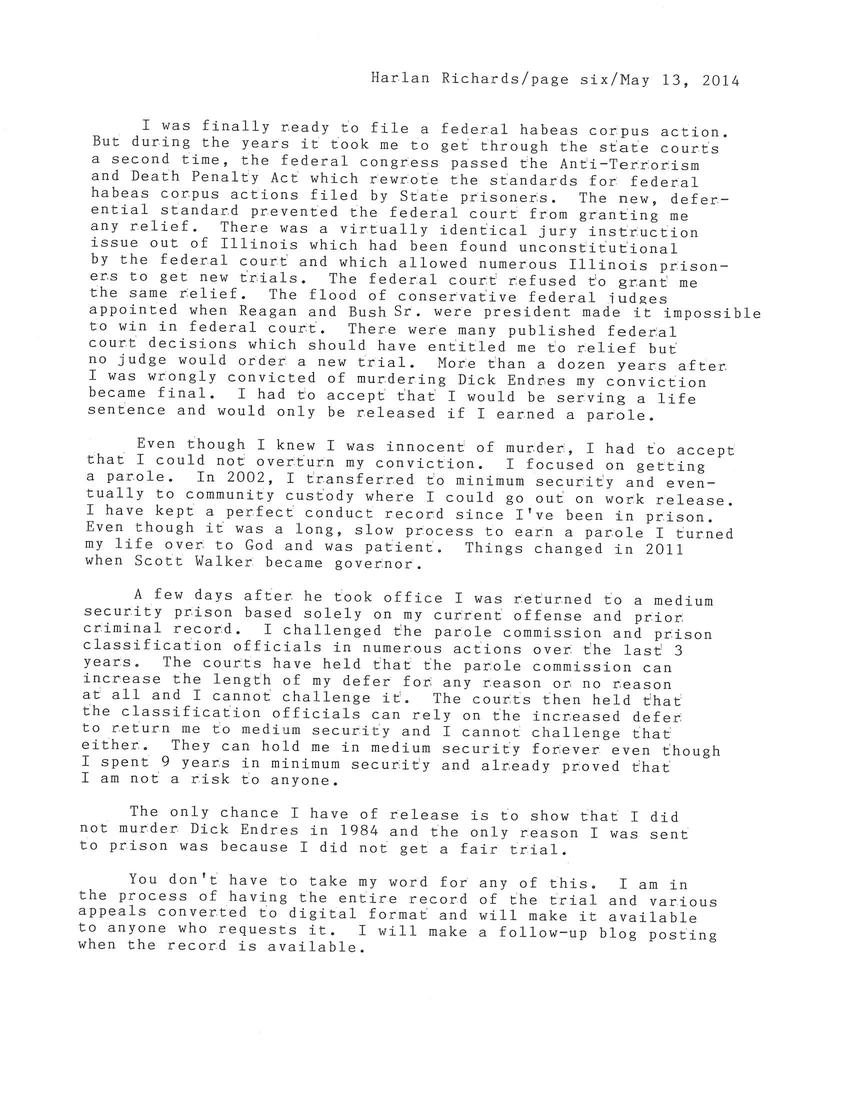

Replies